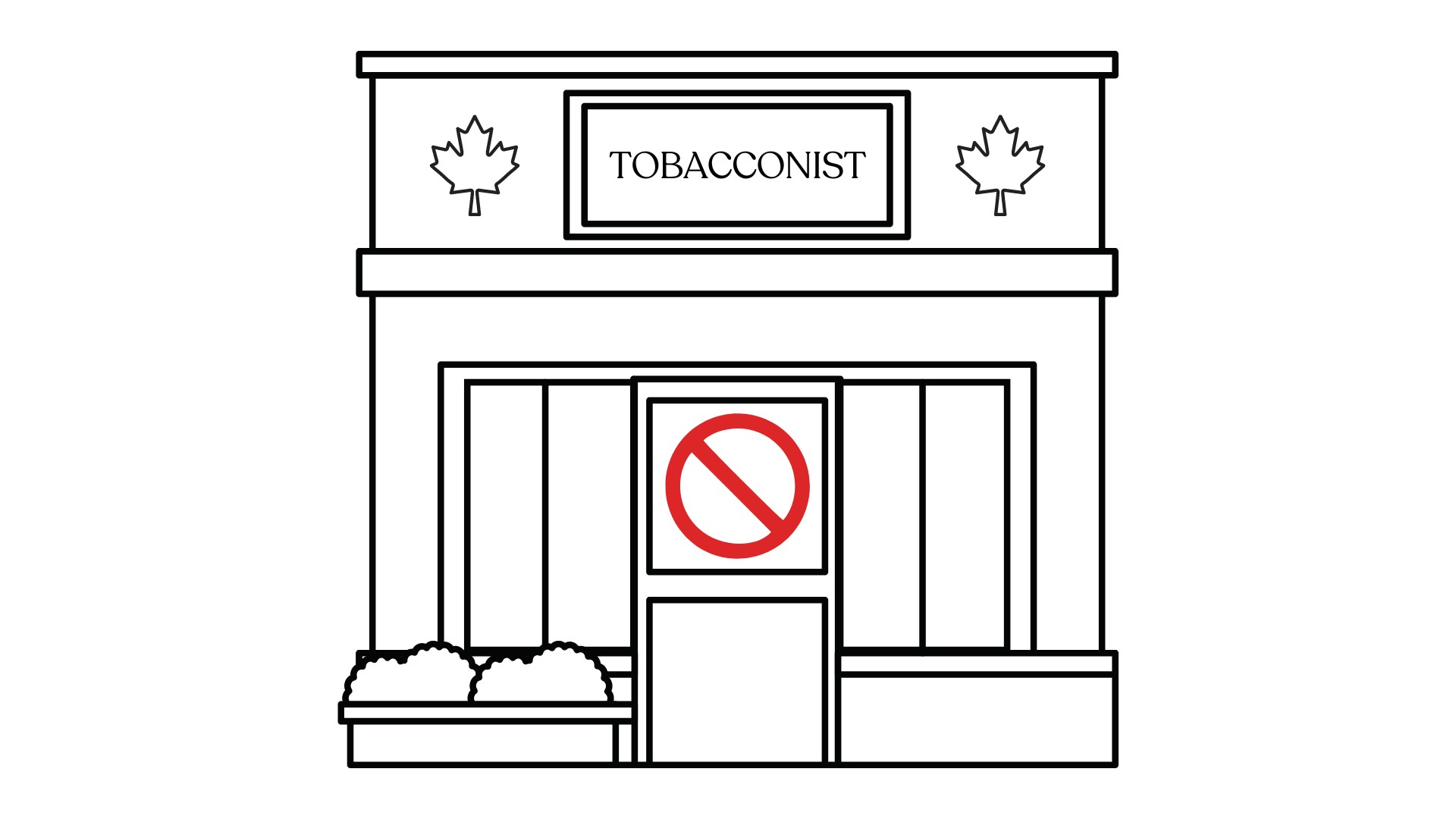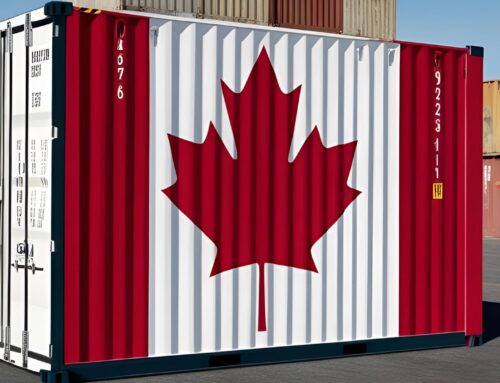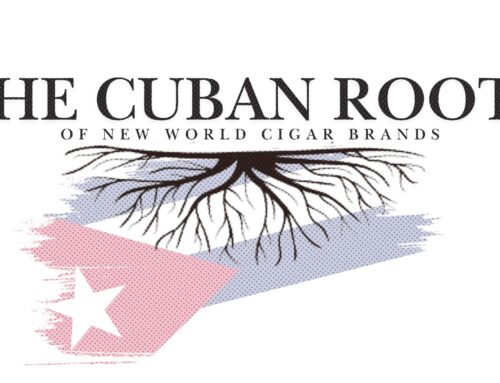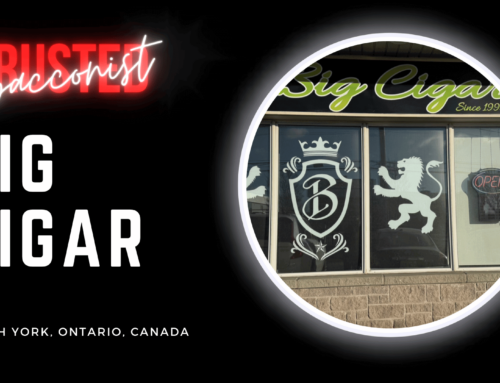Within an environment of increasingly strict tobacco regulations, a Toronto tobacconist location has utilized creative and innovative ways to grow business and deliver customer satisfaction for nearly 3 decades.
Like most of the world, cigar laws in Ontario, Canada are in a state of constant flux. Since the late 1990s, both provincial and federal governments have been aggressively tightening tobacco regulations, making it increasingly challenging for Canadian tobacconists to comfortably sell cigars – and for Canadian aficionados to comfortably enjoy them.
Factors such as high taxation, standardized drab packaging, graphic health warning labels, the restriction of public lounges, out of country shopping, a proliferation of online retailers and grey/black market sellers, and even the seeming requirement to be a social media content creator are among a list of surmounting reasons that have caused some existing tobacconists to sell off their operations and walk away from it all.
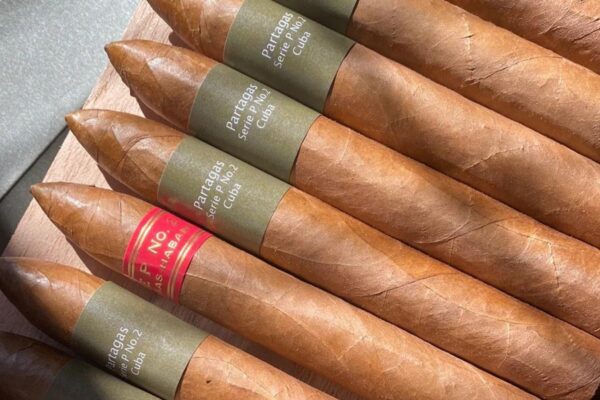
In facing such obstacles, it begs the question as to who’s carrying the torch then when it comes to being a tobacconist in Canada today.
Thankfully, a determined crop of tobacconists exist, who, similar to the generation before them are deftly upholding the industry and are catering to their end consumer through creative and innovative ways.
To better understand how finding success as a Canadian tobacconist has evolved over the years, we spoke with the past and present owners of Cigar Studio, in Toronto, Canada.
Boom Times
Back during the 90’s cigar boom, it’s safe to say that things were very different than today. Due to a sudden, sharp spike in demand for premium cigars (which was largely spurred on by the arrival of Cigar Aficionado Magazine), Canadian tobacconists in the 1990’s were riding a tidal wave of new interest in premium cigars.
Demand for Cuban cigars far exceeded supply, as they were hunted down by not only Canadians, but also embargo-locked Americans who could not get them at home.
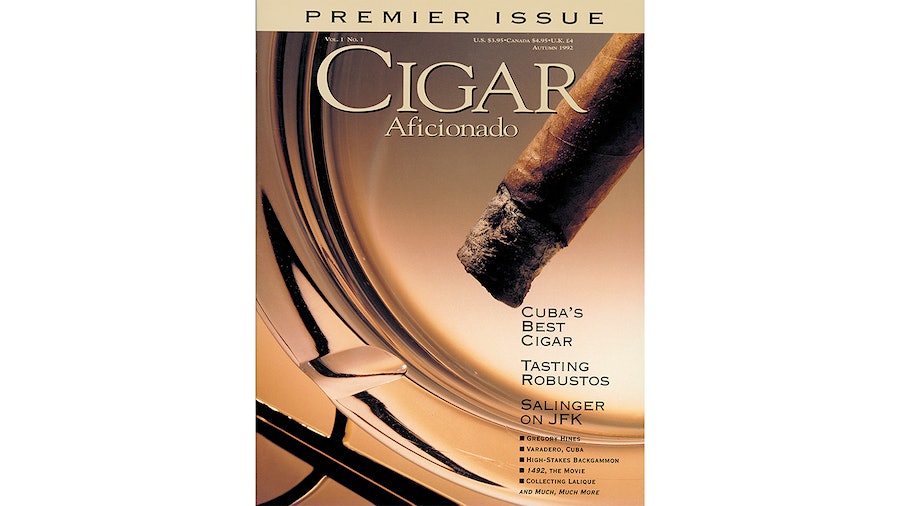
The Big Issue: Cigar Aficionado’s first release in Fall of 1992
Though most people sought out Cuban cigars, many non-Cuban “New World” cigars were becoming increasingly popular too, which served as a viable alternative.
Many tobacconist locations and local establishments offered comfortable indoor lounge areas as well as patios for happy customers to relax and enjoy their purchases among others. Humidors displayed a wide selection of cigars that were adorned in beautifully intricate bands, tubes and boxes. Cigar logos, signs, and advertisements graced the store walls. Owners occasionally smoked in their shop, and although they were considered a luxury item, there was a cigar available for practically every level of society.
Cigar Studio, Toronto, Canada
Jerry Hartman is the former owner and founder of Cigar Studio, a relatively modest 400-square foot-sized tobacconist location in the Etobicoke area of Toronto.
Having opened in 1996, Cigar Studio is presently the longest-running tobacconist location in Toronto.
In 1996, Jerry opened his doors to immediate success: “In ’96, I left a comfortable corporate life as an exec with The Hudson’s Bay Company to become an owner-operator close to my home. I wanted to be my own boss, and there was nothing that existed in my area as far as a tobacconist goes” says Jerry. “Though the [cigar] boom was technically waning at the time, it was thrilling to be immediately successful.”
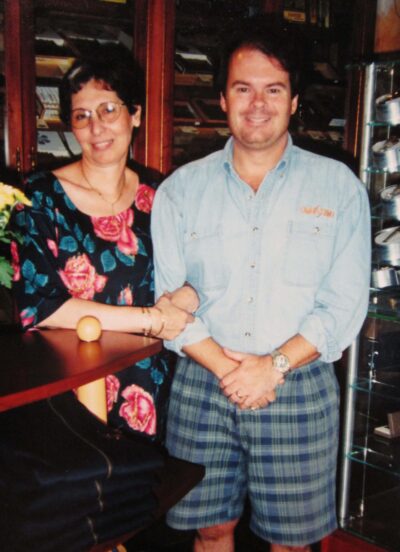
Jerry Hartman and his first employee, Leanora Desola in 1997
Though Jerry didn’t have a lounge at his location, he knew the local landscape very well and worked closely with many of the local restaurants and establishments that allowed patorns to enjoy cigars.
He also had a growing base of loyal customers to whom he regularly communicated with in person and through the mail. “Though regulations were starting to creep in, there was essentially no such thing as a smoking ban at the time. I would call it regulation lite”, says Jerry. “If a local restaurant had a customer that wanted a cigar after dinner, the waiters would either run over to see me, or I would deliver cigars to them. I had a very loyal customer base who I communicated to through a large mailing list. I didn’t have a cell phone. In fact, for as long as the store was under my ownership up until 2023, I operated exclusively without a cell phone”.
Around the time of the milennium, the industry began to contract. Cigars were now being sold in many convenience store locations. Smoking laws were becoming much more prevalent and restaurants began to respond to pushback from customers about smoke.
The boom was over.
Despite a growing inability for people to smoke in public places, Jerry pushed on: “This is a very resilient industry. As a tobacconist you have to get clever. We realized that people like to smoke outdoors, so we began to supply cigars to dozens of local golf courses – some of the top ones in the country like St. George’s and The National [Golf Club of Canada]. We also started partcipating in private events where we could bring 50-100 of our customers to a venue, which restauants typically were more than happy to partcipate in.”
To keep with the times, Jerry ultimately switched over his newsletter mailing list to email and had a very basic website built, but still staunchly preferred face-to-face interraction over the impersonality of digital communications and media.
“It had been 27 years, I was in my late sixties and ready for the golf course”
– Jerry Hartman
Strict Tobacco Laws and the Rise of Digital Media
Over the next two decades, tobacco laws became increasingly stringent and digital media became increasingly prevalent, neither of which sat particularly well with Jerry.
In 2004, the Smoke-Free Ontario Act was put firmly into place, which essentially restricted smoking in all enclosed public places and workplaces, including on the patio of any bar or restaurant or within 9 metres of an entrance or patio. Shocking graphic health warning labels also made their first appearance.
In the year 2019, with the intention of drastically reducing the appeal of all tobacco products to consumers, the government of Canada enacted strict new tobacco product regulations which saw all tobacco products, including cigars, receive a plain and standardized drab brownish green label and packaging, complete with large health warning labels.
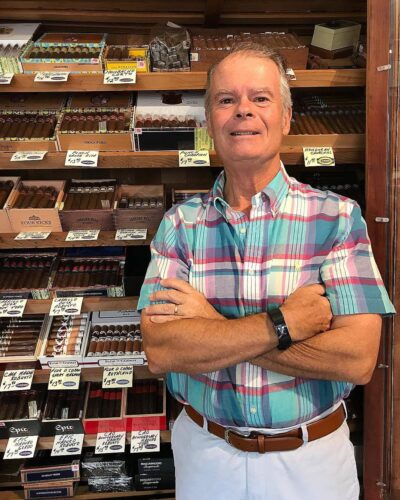
Jerry Hartman in the Cigar Studio humidor in 2018
Years later during the Covid-19 pandemic, business skyrocketed for most Canadaian tobacconists as people looked for new ways to unwind and free themselves from the woes of the world while borders to the US (and other locations were cigars could be bought at cheaper prices) were closed off.
Although Jerry was enjoying a healthy extra dividend as a result opf closed borders, he decided that it was time to sell off the business. “It had been 27 years, I was in my late sixties and ready for the golf course. The regulations were becoming increasingly challenging, and though I knew the importance of digital media, my anti-technology stance was slowly starting to hurt the business” he says.
In January of 2023 at the age of 68, Jerry Hartman officially sold Cigar Studio operations to Kes Michaelides and Mike Murray, two loyal customers of the shop who also had travelled with Jerry to various destinations such as Nicaragua and Cuba, all in the name of cigars.
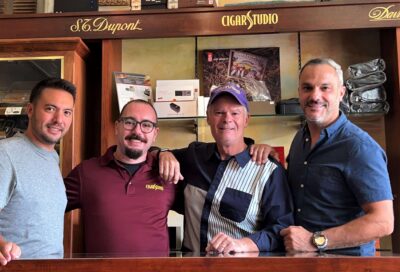
L to R: Mike Murray, full-time staff member Alex Pigulski, Jerry Hartman and Kes Michaelides in 2023
A Sense of Community
As new owners, Kes and Mike understood the growing importance of social media but also knew that similar to Jerry, they had to be visible at events within the community and had to offer a unique experience to people who visit Cigar Studio.
“We aren’t salesmen, we’re guides to walk people through different ideas and different products to ultimately take them on a journey. The one-on-one experience makes us much more of a destination instead of a pit stop to stock up on cigars”.
– Kes Michaelides
Kes recognizes Jerry’s ethic for maintaining regular communication with customers, no matter how old-school his methodology was: “Back when we were customers, Jerry was still sending out newsletters in the mail. I thought it was a bit kitchy, but I always read it. He showed up for the comunity at events and he also threw his own. Today we’re still carrying on all of these things, just on a bigger level through constantly putting out digital media content and by hosting and showing up at way more events. To be honest, we’ll be there for anyone who will have us.”
Today, Kes and Mike utilize and build upon the orignal customer POS data system that was manually started by Jerry back when he was mailing out postcards and newsletters in the 1990s and early 2000s.
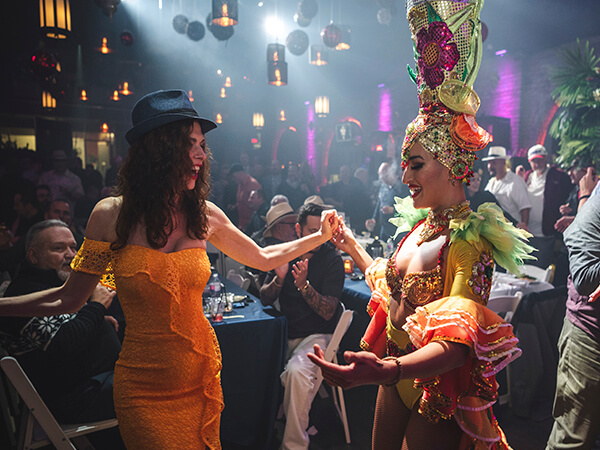
‘Havana Navidad’, was a very well-attended Christmastime cigar event organized by Cigar Studio under Kes & Mike
While strictly bargain-motivated customers may decide to hunt down cheaper cigars from the US or from certain online retailers, Kes and Mike recognize a need to foster a sense community with their customers through putting on regular events. They further recognize a need to deliver excellent customer service and product eduaction, as well as offer a highly specialized curation of cigars to set them apart from the others.
“There’s no sense of community created through merely getting a deal on a cigar” says Kes. “We aren’t salesmen, we’re guides to walk people through different ideas and different products to ultimately take them on a journey. The one-on-one experience makes us much more of a destination instead of a pit stop to stock up on cigars”.
Rolling with the Punches
Unlike Jerry, Kes and Mike had begun their tenure as a tobacconist in an evironment that was already rife with strict regulations, most of which they had already become acquainted with as customers beforehand. “We were born into this” says Kes. “It’s much harder for the older guys to adapt. We’re used to heavy regulations and [Health Canada] inspectors coming around – this is our norm. When plain packaging happened, we saw that no one stopped smoking cigars. Cigar lovers will always find a way to smoke and to enjoy good cameraderie and we’re committed to be there to provide them with both.”
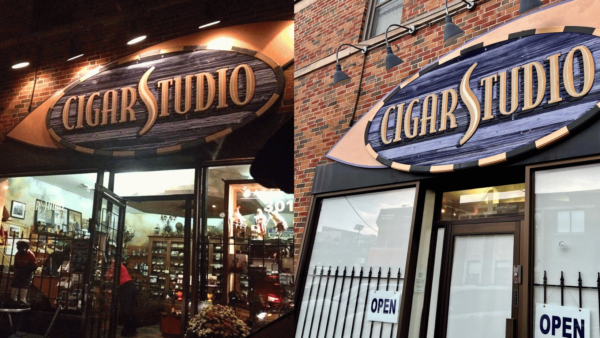
Whiteout: to comply with ongoing regulations, tobacconists have been forced to obscure visibility of the store interior from the outside
As public lounges have essentially dissappeared, a proliferation of speakeasy-style lounges have emerged, which are typically associated with a particular tobacconist and are located on separate private premises.
Today, Jerry, Kes, and Mike still hang out to enjoy conversation and cigars. “They still call me a ludite, a dinosaur”, says Jerry jokingly. “I offer the guys less advice these days but they also ask for less”, adds the retired tobacconist. “They have many challenges on their hands, but much of the industry is smart and very, very resilient – they’ll find a way.”
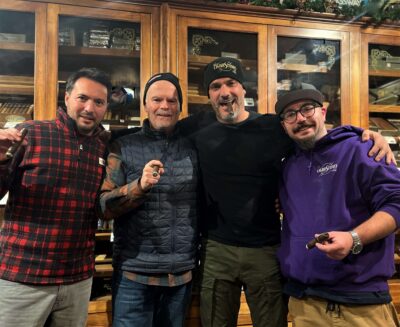
Since taking over Cigar Studio, Kes and Mike have added an additional full-time employee (Edward Pugulski joined his brother Alex), have orchestrated several large-scale events, continue to appear at various events and fundraisers around Toronto and beyond, and have big plans to further plans to shake up the Ontario cigar scene at large.
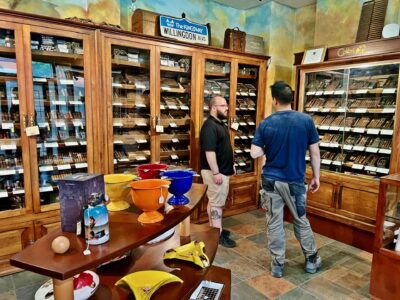
Employee Edward offers assistance to a customer
“To not only survive but actually thrive in this market, we have no choice, we have to do more and be better” says Kes with a big smile. “Just like Jerry, we have to constantly hustle; only our hustle is different ‘cuz we are not against technology and we actually use a cell phone!”
Cigar Studio is located at 4 Willingdon Blvd., Toronto, Ontario Canada and can be reached at (416) 237-9470 or hello@cigarstudio.com.
To find a trusted tobacconist near you, visit our Store Locator; the most complete database of Canadian tobacconists.
